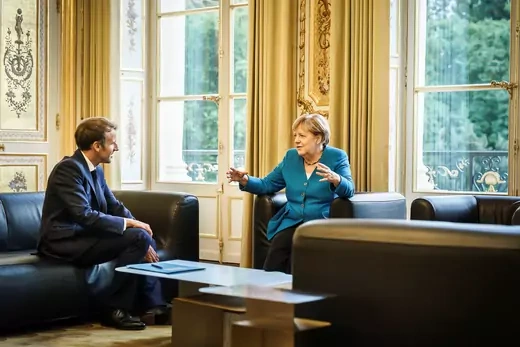Merkel’s Legacy and the Future of Germany
With Chancellor Angela Merkel stepping down after sixteen years in office, the leadership of Germany, and the EU, is wide open. What is Merkel’s legacy, and what comes next?
What were Chancellor Angela Merkel’s most important and far-reaching decisions?
Domestically, a few stand out, including her 2009 introduction of a constitutional debt brake (Schuldenbremse) guaranteeing balanced budgets, her 2011 resolution to phase out nuclear energy after Japan’s Fukushima disaster, and her 2015 decision to override EU rules on asylum seekers and open Germany’s borders to more than one million refugees from Syria and elsewhere.
At the EU level, there was her insistence on austerity and structural reform during the eurozone debt crisis, her determination to complete the controversial Nord Stream 2 natural gas pipeline with Russia, and her acceptance of jointly issued EU debt in anticipation of the economic fallout of the COVID-19 pandemic.
She was often labeled the standard-bearer for liberal democracy and the transatlantic alliance. Has that held up?
The “leader of the free world” moniker was always a bit of an exaggeration. It is true that Merkel, compared to populist strongmen leaders such as U.S. President Donald Trump, Brazilian President Jair Bolsonaro, or British Prime Minister Boris Johnson, looked like the epitome of rational and steady leadership. But as Rutgers University Professor R. Daniel Kelemen and I have argued, Merkel has been mostly guided by what we dub “Merkantilism,” the systematic prioritizing of German commercial and geoeconomic interests over democratic values, human rights, and intra-EU solidarity.
There are numerous examples. During the Greek debt crisis, Merkel’s primary policy aim was to protect the solvency of German banks, and putting the main burden of adjustment on Southern Europe through austerity and structural reform policies has left lasting scars. She was unwilling to directly confront the authoritarian tendencies of Prime Ministers Viktor Orban in Hungary and Jaroslaw Kaczynski in Poland, partially due to German commercial interests. She pursued a comprehensive investment agreement with China over opposition from other EU leaders. And in the wake of Russian President Vladimir Putin’s 2014 annexation of Crimea, she undermined her own sanctions regime against Russia to give Putin the much bigger prize of Nord Stream 2.
She spent much of her tenure governing in large coalitions, particularly with the opposition Social Democratic Party of Germany (SPD). How did her governing style affect German politics?
In directly co-opting many popular ideas that were put forward by the center-left SPD—including a minimum wage and more generous pensions—Merkel cleverly occupied the center ground of German politics, which has made her such a powerful electoral force. Most analysts agree that her party, the Christian Democratic Union of Germany (CDU), would comfortably win the next elections if she were running for a fifth term.

Her consensual style—and way of adopting her opponents’ policy proposals—has allowed the SPD candidate for chancellor and current finance minister, Olaf Scholz, to claim that he, rather than the CDU’s Armin Laschet, is Merkel’s true heir. And it seems to be working: the SPD has reversed its deficit and is leading in most polls. Sixteen years of Merkel have shown that occupying the center is a recipe for success.
What were the implications of her leadership of the EU? Are there other figures in Europe who could fill that role?
While Merkel undoubtedly kept the EU together during a decade of crises—including the euro debt crisis, Russian aggression in Ukraine, a surge in refugees, the Brexit vote in the United Kingdom (UK), and the transatlantic rift during Trump’s presidency—arguably her most important decision has been her embrace of jointly issued EU bonds in the spring of 2020. Softening Germany’s long-held opposition to deeper EU economic integration, this pooled debt mechanism has the potential to open the door to a new era.
French President Emmanuel Macron, meanwhile, would love to take the mantle of leader of the EU, but he does not have the same Europe-wide popular appeal as Merkel, and France no longer has the diplomatic clout it once did. For better or worse, either Scholz or Laschet—the two politicians most likely to take over from Merkel—are bound to become the new leaders of the EU. That said, they will only be effective if they have a good working relationship with Paris, and it will take time for them to gain the same amount of trust and political capital Merkel carefully built up over the years.
What are the biggest foreign policy challenges the next German government will face?
The primary challenge will be to give concrete meaning to the EU’s new big idea of “open strategic autonomy,” currently a somewhat-vague goal of increasing EU global influence through greater sovereignty. The recent defense deal between Australia, the UK, and the United States, as well as the U.S. withdrawal from Afghanistan, are two painful reminders to EU members that they need to get their act together on a common defense policy if they want to be serious players in global affairs. German political elites have so far been reluctant to commit in that arena.
Another major challenge will be to convince the rest of the world to tackle climate change. Berlin will need to lead by example by transforming its own industrial machine, which continues to rely heavily on fossil fuels, toward renewable energy. Coalition negotiations, which are bound to be long and arduous, will shed more light on whether the Germans are up to the task.
